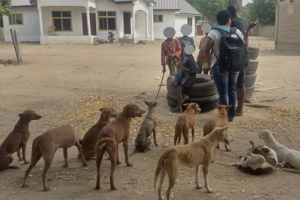Breakthrough ACTION worked with the Ghana Health Service (GHS) Health Promotion Division (HPD), Veterinary Services, Ministry of Agriculture and Health, USAID, and other stakeholders to conduct formative research in February–March 2023 to inform communication strategies and public health messages promoting rabies prevention behaviors. The Understanding Multilevel Factors that Influence Risk of Rabies in Ghana study assessed awareness and knowledge of health risks from zoonotic diseases and specifically focused on risk behaviors related to rabies, symptoms in animals and humans, prevention strategies, and reporting mechanisms.
The analysis explored multilevel factors that influence behaviors at the animal-human interface. Breakthrough ACTION conducted 48 focus group discussions in four districts with groups comprising adult men, adult women, and children 10–17 years old. Participants described a variety of perspectives on the role of animals in the household and community, including as a source of protection, food, income, and transportation. Dogs were described as having spiritual significance. Men typically cared for dogs, but many of these were left unconfined, particularly during the dry season.
Participants’ awareness and knowledge of rabies varied, with most participants knowing about an illness that caused aggressive behavior or “madness” in dogs; however, participants wanted more information and also shared misinformation about rabies. Risk perception was high, particularly with respect to children and butchers or food vendors.
A growing dog and dog meat market supported the sale and consumption of dog meat, including the meat of animals believed to be sick with rabies. Many people believed rabies could be treated through traditional remedies, and many also patronized this approach for rabies prevention and treatment, even when conventional medical services were provided. Reporting mechanisms for dog bites or other rabies exposure incidents are not well-understood by communities. Few communities had access to animal health workers, and rabies vaccinations were scarce or unaffordable.


